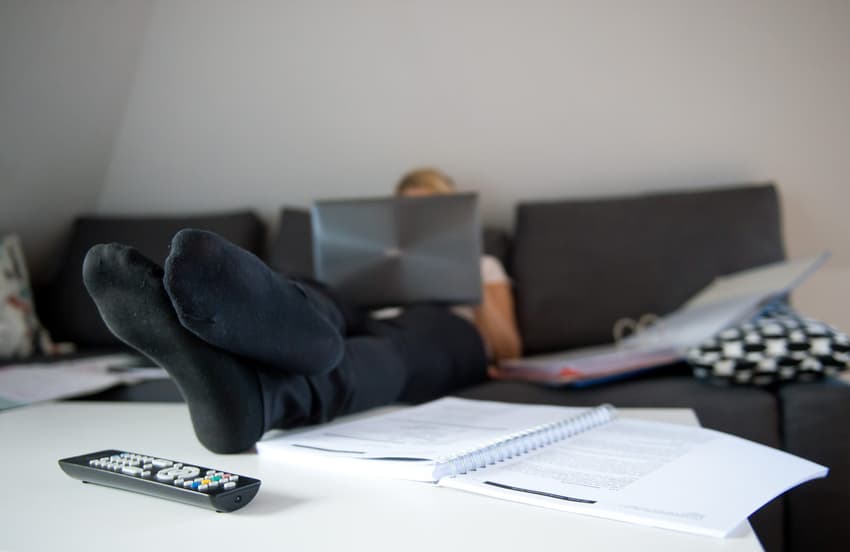Myth-busting: Do Germans really have a perfect work-life balance?

It's common to hear that Germans are great at switching off once their working hours are done, but according to a new survey, this may not be entirely true.
If you've ever tried to call the tax office at 3pm on a Friday afternoon, you'll know from personal experience that Germans love a Feierabend (evening off).
Particularly for people from the US, who normally get around 10 paid days off a year, the working conditions in Germany are something to celebrate. Not only do Germans get a minimum of 24 days off work, they also get generous maternity and paternity cover and a myriad of public holidays to boot.
But a new report suggests that the work-life balance isn't necessarily all its cracked up to be, pouring cold water on the idea of the well-rounded German lifestyle.
The survey commissioned by Novotel surveyed around 5,000 adults across Germany, the United Kingdom, the Netherlands and Poland to investigate their habits and working schedules. Surprisingly enough, it found that the Germans have the worst work-life balance of all four countries, with 58 percent work and only 42 percent leisure time.
In comparison, British people reported devoting 55 percent of their time to work and 45 percent to their private lives, while the lucky Poles have managed to achieve a perfect 50/50 split.
Feierabend or overtime?
So, how much time does the average German really spend working? Apparently, it's eight hours and ten minutes per day - just slightly over the 40-hour working week that most contracts mandate.
However, it seems that the trend of slamming the laptop closed and skipping to the pub for a Feierabendbier (after-work drink) straight from the office may be increasingly out of step with reality. In fact, Germans on average put in almost five hours of overtime each week - more than any other country surveyed.
The most common tasks that employees in Germany do outside of regular working hours include: sending or reading emails (46 percent), making or receiving phone calls (33 percent) and writing to-do lists (33 percent).
READ ALSO: Working in Germany: 7 factors that can affect how much you’re paid
In a typical week, Germans have the least time for themselves at five hours and 46 minutes, while the British have almost an hour more at six hours and 37 minutes.
Though it may sound like Germany is a nation of workaholics, it seems that the results have much more to do with an increasingly pressurised work environment.
According to the survey, 18 percent of Germans are satisfied with the current ratio: most say they would prefer the work-life balance to be the opposite way around, with 43 percent for work and 57 percent private time.
To improve this split where possible, 48 percent try to get a healthy amount of sleep each night, 51 percent avoid talking about work on the weekend, and 37 percent try to schedule a lunch break every day.
Impact of the pandemic
It's no secret that Covid-19 has turned all our lives upside down, particularly when it comes to the world of work.
Home office has become the new normal for many people in Germany, and recently the Ministry for Labour and Social Affairs even floated the idea of enshrining the right to work from home in law.

A woman sits at a desk while working from home. 'Home office' promises a lot - but does it deliver?Photo: picture alliance/dpa | Finn Winkler
But does that really lead to a better work-life balance?
In spite of the saved commuting time and the convenience of swapping a suit for some pyjamas, 28 percent of Germans reported that they actually spent more time working throughout the pandemic than before it.
In addition, the survey showed that 43 percent of Germans used their commuting time to get some additional work done. The typical working commute lasted 31 minutes, with more than a third (35 percent) saying it helped them feel well set-up for the day ahead.
READ ALSO: German lifestyles become ‘more sluggish’ due to pandemic
'Workations' and 'bleisure'
According to Stephanie Rowe, a spokesperson for Novotel, two interesting trends have sprung up this year in the world of work: "workations", where people combine work and vacations, and "bleisure", a combination of business and leisure.
Though the most cynical among us may see this as a damning indictment of the current working world, apparently 88 percent of Germans have reported managing to carve out some valuable "me time" on a recent business trip.

A woman works at a cafe in Madiera, Portugal. For many Germans, vacations have turned into "workations" recently. Photo: picture alliance/dpa/Startup Madeira | Startup Madeira
However, Rowe points to the fact that more than a quarter (27 percent) of Germans have had to sign off work due to stress as a sign that work-leisure balance simply isn't good enough.
"The last two years have undoubtedly had an impact on our overall routines and priorities, especially working hours, as many homes have also become workplaces," she said. "Even if you are working intensively on something, you should also schedule leisure activities to switch off."
If these revelations are all a little bit too mind-blowing, it might be a relief to find out that some of the stereotypes do hold true: Germans end their working day the earliest at 5:36pm, while Poles, in contrast, tend to work until around 7pm each day.
READ ALSO: Six golden rules for creating the ideal German cover letter and résumé
And what of the humble Feierabendbier that is so celebrated in those Schultheiss adverts? That, too, may be just a little bit of a myth. (Sorry.)
In fact, when most German workers want to switch off, they opt for watching TV (61 percent), taking a bath or shower (42 percent) or going out to eat (36 percent).
Still, one-sixth say they constantly have work on their mind, and 42 percent wish they had more time for themselves.
"Three out of ten respondents want to improve their work-life balance this year," said Rowe. "We encourage employees to re-energise relationships with people they hold dear, travel, explore, re-experience things and take time off this year and use it well."
Comments
See Also
If you've ever tried to call the tax office at 3pm on a Friday afternoon, you'll know from personal experience that Germans love a Feierabend (evening off).
Particularly for people from the US, who normally get around 10 paid days off a year, the working conditions in Germany are something to celebrate. Not only do Germans get a minimum of 24 days off work, they also get generous maternity and paternity cover and a myriad of public holidays to boot.
But a new report suggests that the work-life balance isn't necessarily all its cracked up to be, pouring cold water on the idea of the well-rounded German lifestyle.
The survey commissioned by Novotel surveyed around 5,000 adults across Germany, the United Kingdom, the Netherlands and Poland to investigate their habits and working schedules. Surprisingly enough, it found that the Germans have the worst work-life balance of all four countries, with 58 percent work and only 42 percent leisure time.
In comparison, British people reported devoting 55 percent of their time to work and 45 percent to their private lives, while the lucky Poles have managed to achieve a perfect 50/50 split.
Feierabend or overtime?
So, how much time does the average German really spend working? Apparently, it's eight hours and ten minutes per day - just slightly over the 40-hour working week that most contracts mandate.
However, it seems that the trend of slamming the laptop closed and skipping to the pub for a Feierabendbier (after-work drink) straight from the office may be increasingly out of step with reality. In fact, Germans on average put in almost five hours of overtime each week - more than any other country surveyed.
The most common tasks that employees in Germany do outside of regular working hours include: sending or reading emails (46 percent), making or receiving phone calls (33 percent) and writing to-do lists (33 percent).
READ ALSO: Working in Germany: 7 factors that can affect how much you’re paid
In a typical week, Germans have the least time for themselves at five hours and 46 minutes, while the British have almost an hour more at six hours and 37 minutes.
Though it may sound like Germany is a nation of workaholics, it seems that the results have much more to do with an increasingly pressurised work environment.
According to the survey, 18 percent of Germans are satisfied with the current ratio: most say they would prefer the work-life balance to be the opposite way around, with 43 percent for work and 57 percent private time.
To improve this split where possible, 48 percent try to get a healthy amount of sleep each night, 51 percent avoid talking about work on the weekend, and 37 percent try to schedule a lunch break every day.
Impact of the pandemic
It's no secret that Covid-19 has turned all our lives upside down, particularly when it comes to the world of work.
Home office has become the new normal for many people in Germany, and recently the Ministry for Labour and Social Affairs even floated the idea of enshrining the right to work from home in law.

But does that really lead to a better work-life balance?
In spite of the saved commuting time and the convenience of swapping a suit for some pyjamas, 28 percent of Germans reported that they actually spent more time working throughout the pandemic than before it.
In addition, the survey showed that 43 percent of Germans used their commuting time to get some additional work done. The typical working commute lasted 31 minutes, with more than a third (35 percent) saying it helped them feel well set-up for the day ahead.
READ ALSO: German lifestyles become ‘more sluggish’ due to pandemic
'Workations' and 'bleisure'
According to Stephanie Rowe, a spokesperson for Novotel, two interesting trends have sprung up this year in the world of work: "workations", where people combine work and vacations, and "bleisure", a combination of business and leisure.
Though the most cynical among us may see this as a damning indictment of the current working world, apparently 88 percent of Germans have reported managing to carve out some valuable "me time" on a recent business trip.

However, Rowe points to the fact that more than a quarter (27 percent) of Germans have had to sign off work due to stress as a sign that work-leisure balance simply isn't good enough.
"The last two years have undoubtedly had an impact on our overall routines and priorities, especially working hours, as many homes have also become workplaces," she said. "Even if you are working intensively on something, you should also schedule leisure activities to switch off."
If these revelations are all a little bit too mind-blowing, it might be a relief to find out that some of the stereotypes do hold true: Germans end their working day the earliest at 5:36pm, while Poles, in contrast, tend to work until around 7pm each day.
READ ALSO: Six golden rules for creating the ideal German cover letter and résumé
And what of the humble Feierabendbier that is so celebrated in those Schultheiss adverts? That, too, may be just a little bit of a myth. (Sorry.)
In fact, when most German workers want to switch off, they opt for watching TV (61 percent), taking a bath or shower (42 percent) or going out to eat (36 percent).
Still, one-sixth say they constantly have work on their mind, and 42 percent wish they had more time for themselves.
"Three out of ten respondents want to improve their work-life balance this year," said Rowe. "We encourage employees to re-energise relationships with people they hold dear, travel, explore, re-experience things and take time off this year and use it well."
Join the conversation in our comments section below. Share your own views and experience and if you have a question or suggestion for our journalists then email us at [email protected].
Please keep comments civil, constructive and on topic – and make sure to read our terms of use before getting involved.
Please log in here to leave a comment.